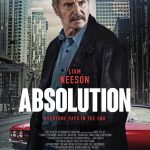A generational story about families and the special place they inhabit, sharing in love, loss, laughter, and life.
Chuck says:
As an art installation, Robert Zemeckis’ “Here” might have worked. As a movie, it’s a noble failure. From “Who Framed Roger Rabbit?” to “Forrest Gump” to” The Polar Express,” the director has always been eager to use whatever cutting edge technology has crossed his path, his curiosity to use the latest gimmick sometimes undermining his better filmmaking instincts. That’s surely the case here, as the concept behind “Here,” telling its various stories from a fixed perspective, becomes a stagnant, frustrating exercise that ends up being more a curiosity than an engaging cinematic experience.
From the prehistoric era to modern day, the film touches upon various stories that occur over this period, all of them taking place in the same spot, which would eventually become New Jersey. As such, the camera never moves, though the setting, obviously changes. We witness the Earth go through its birth throes and the extinction of the dinosaurs, a Native American couple fall in love and have a family, the building of a colonial mansion by Benjamin Franklin’s illegitimate son William, and the building of a modest home across from that sprawling estate.
It is in this home that most of the action occurs, as erratic as it is, a variety of families living there over the course of the 20th century and into the 21st. A turn-of-the-century couple, the Marters (Gwilym Lee and Michelle Dockery), buy it first, he a pilot in the burgeoning aviation industry, her a domestic worry wart; the Beekmans (David Fynn and Ophelia Lovibond), he the inventor of what will be a radical domestic fixture, she a kept wife, take possession next; a World War II veteran and his pregnant wife, Al and Rose (Paul Bettany and Kelly Reilly) move in during the mid 1940’s; and finally, Devon and Helen Harris (Nicholas Pinnock and Nikki Amuka-Bird), along with their teenage son, Justin (Cache Vanderpuye) inhabit the dwelling during the Covid epidemic.
The screenplay by Eric Roth and Zemeckis takes the viewer up and down this broad narrative timeline in a random fashion that proves frustrating. Some families are given more time than others and as a result, their stories come off as underdeveloped and incomplete. This gives the movie a fragmented feel that challenges our engagement, our interest in the Franklins, the Marters and Harris’ cursory at best. The inclusion of the latter family is particularly awkward, an obvious play for inclusion and a “woke” label that proves insulting.
The bulk of the film is devoted to Al, Rose, their son Richard (Tom Hanks) and his wife Margret (Robin Wright). Having to get married at 18 due to an unexpected pregnancy, the latter two move into the home and as a result, their family occupies it the longest. Needless to say, the cramped quarters, which also include Al and Rose’s two younger children, creates a great deal of tension as well as dramatic complications.
Had Roth and Zemeckis focused primarily on this family, the film might have been effective. What with Al’s bitterness towards the world, Rose’s quiet dissatisfaction with her husband, Richard’s fear to leave the home and Margaret’s anger over being stuck in a house that never feels like her own, there’s plenty of drama to sustain an entire feature. More importantly, it would have allowed us to become more emotionally invested in these characters, something vital to making this story work which Zemeckis botches with his constant flitting about.
For the most part, the digital effects used to alter the characters’ appearance works, as long as extreme close-ups aren’t used. And as one would expect, the veteran cast accord themselves well, each hitting the right emotional notes throughout. Hanks and Wright are particularly good, so much so, I wished they been paired more often in their careers.
What’s the message of “Here?” As far as I can tell, it’s that the more things change, the more they remain the same. No matter what time period you may have lived in, people have faced the same problems. Conflicts between children and their parents, social issues threatening the safety of the community, the ups and downs of marriage and times of great happiness and security are all on display in each of the eras we witness. Far from profound, the obvious nature of the film’s theme is only outdone by its ham-fisted approach.
2 Stars




